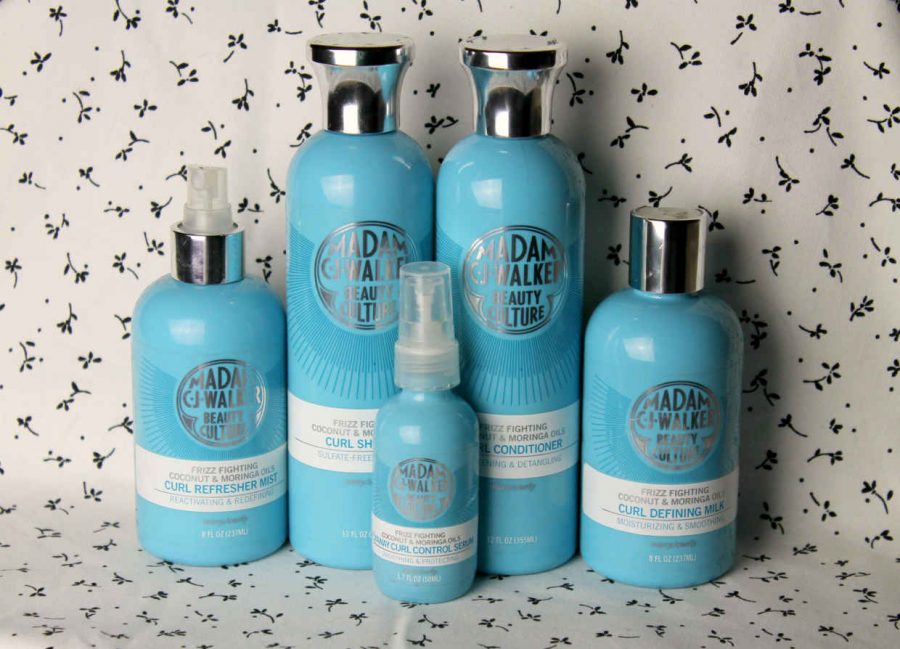Woman of the Month: Walker grows hair and business
Madam C.J. Walker’s hair products are still available today, helping women care for their hair.
October 31, 2019
Madam C.J. Walker was an influential woman who utilized hair to inspire confidence in the women of her time and today.
In 1867, Sarah Breedlove was born to former slaves Minerva and Owen Breedlove. By the age of seven, both of Sarah’s parents had died, forcing her to move in with her sister and her sister’s abusive husband in Mississippi. To escape the abuse, Sarah, at the age of fourteen, married Moses McWilliams. The couple was married for six years, with their daughter Lelia born four years into the marriage. Tragically, two years following the birth of Lelia, Moses was lynched, leaving twenty-year-old Sarah a widow.
Fearful of the risks of life in Mississippi, Sarah moved to Missouri, where she put Lelia through college working as a cook and a laundress. Having never received an education, Sarah was proud to provide her daughter with better opportunities than her own.
Sarah’s journey to becoming Madam C.J. Walker began with the loss of her hair. Similar to many other black women of her time, Sarah’s method of hair care was to tightly wrap and twist her hair. This rough treatment of the hair and scalp often resulted in pain and hair loss. Sarah struggled to uncover a product to reverse the damage to her scalp, trying every product she could get her hands on. Disheartened at the lack of improvement, Sarah created a hair product of her own. Sarah’s hair formula consisted of hair products and patent medicines, a recipe she claimed was God’s answer to her prayers.
“‘One night I had a dream, and in that dream a big black man appeared to me and told me what to mix up for my hair. Some of the remedy was grown in Africa, but I sent for it, mixed it, put it on my scalp, and in a few weeks my hair was coming in faster than it had ever fallen out. I tried it on my friends; it helped them’” Madam C.J. Walker said.
Motivated by the success of her hair product on her friend’s and her own hair, Sarah went door-to-door, selling it to women in the local black community.
With its ability to grow strong and healthy hair, Sarah’s product became known as “Wonderful Hair Grow”.
Moving to Denver in 1905 following the finalization of her “Wonderful Hair Grow”, Sarah continued to churn out products, broadening her horizons to encompass products related to skincare. Used in conjunction with her comb specially designed for thick hair, Sarah’s “Glossine” hair oil, “Tetter Salve” for psoriasis, and “Temple Grower” enabled black women to more easily care for their hair and skin.
Sarah strongly believed one of the ways financial power and business careers could be accessible to black women was by adhering to the beauty standards of mainstream white society. Sarah’s belief was enhanced by her products, aiding not only in the improvement of personal hygiene but also in boosting their self-esteem. By providing black women with hair care products that augmented self-esteem, Sarah enabled black women to feel comfortable and confident in a world filled with people waiting to push them down.
In 1906, Sarah remarried Charles Joseph Walker, a man who served as inspiration for her legacy. Despite their marriage lasting only a couple of years, the partnership provided Sarah’s company with better advertising and a new name for both Sarah and the company — Madam C.J. Walker Manufacturing Company.
Sarah spent the next few years traveling across the nation, promoting her products, and growing her business empire by establishing Lelia College, a cosmetology school in Pittsburgh. In 1910, impressed by the location and transportation, Sarah finally settled her company’s headquarters in Indianapolis.
Sarah built her business the American way. She employed a nationwide sales force to sell the products she manufactured in her own plant and self-promoted her products through the beauty shops she owned. Sarah’s promotion of the products was not confined to Indianapolis. She continued her tradition of traveling town-to-town, personally advertising the hair products, and sought the acquaintance of civic and religious leaders and the CEOs of leading black businesses. Sarah hoped that the patronage of influential people would garner attention from the rest of the nation.
Sarah’s efforts were a success. By 1917, with annual revenues of approximately $500,000, “Madam C.J. Walker Manufacturing Company was the largest black-owned business in the country” (Madam C.J. Walker). Furthermore, Sarah had achieved a life-long goal. Sarah’s employment of women called Walker agents presented black women with the opportunity to support themselves financially in the segregated pre-WW1 era.
When addressing delegates of the National Negro Business League, Sarah stated: “I have made it possible for many colored women to abandon the washtub for a more pleasant and profitable occupation … The girls and women of our race must not be afraid to take hold of business enterprise.” (Madam C.J. Walker)
Sarah, with her hair products and employment of black women, changed the lives of black women forever. Sarah, Madam C.J. Walker, proved to the world that an under-educated, oppressed woman could rise above society’s perception of her, and succeed. Sarah was a strong, resilient woman who fought for everything she had. Her determination to make life better for women and their children, demonstrates courage and faith, two of the most admirable qualities. She took the loss of her hair, an event filled with humiliation, and transformed it into a revolution.
Sarah Walker was a black woman, one of the lowest classes in America. But, she did not let her place in society hinder her from empowering black women. By supplying women with products to facilitate the maintenance and growth of hair, Sarah provided black women with the ability to feel confident, and her employment of said women further enabled them to improve their way of life.
In addition to her influence on black women, Sarah’s ownership of a successful company profiting from a feminine concept like hair, demonstrated to the women of her time and to the women of today, that they could hold powerful positions of power. Most women of Sarah’s time were beholden to the men in their lives, but Sarah proved that a woman could make her own way, and answer only to herself. Sarah Walker bridged the gap between feminism and business, forever changing the world’s path.









Allison • May 19, 2020 at 6:46 am
Bonjour Je suis à la recherche des produits de madame walker, et que c’est difficile pour trouver ses produit alors qu’on dit que c’est une grande marque qui a fait révolutionner le monde pour les cheveux crépus à croire qu’on ne veut jamais faire les noirs apparaître sur internet ou quoi

 … je n’ai toujours pas trouvé où acheter ces fameux produits miracle je suis effondré…. puis je savoir où je peux les retrouver s’il vous plaît mon adresse email emerode_972@hotmail.fr merci de votre part et bonne journée….
… je n’ai toujours pas trouvé où acheter ces fameux produits miracle je suis effondré…. puis je savoir où je peux les retrouver s’il vous plaît mon adresse email emerode_972@hotmail.fr merci de votre part et bonne journée….
Athena Lewin • Apr 26, 2020 at 4:37 pm
Recently, I have been receiving inquiries about where one can find the products. During my research, Sephora was a store I found that supplied Madam C.J. Walker’s products. While I am unsure if they still stock the products, for anyone who is searching for the products, I would advise them to start with a call to their local Sephora.
Tina Ramirez • Apr 26, 2020 at 4:22 pm
Please can you send me madam CJ Walker products in Sample products . I will post it on my page of how good the products are my name is Tina Ramirez my email address is Tina Ramirez 409 at gmail.com my phone number is 704-352-7516
lorraine branch • Apr 12, 2020 at 1:33 pm
I want to order but having great difficulty finding it
Where do I order Maddam C.J. Walker products